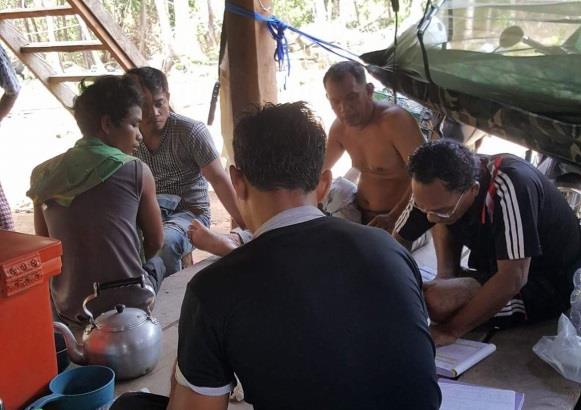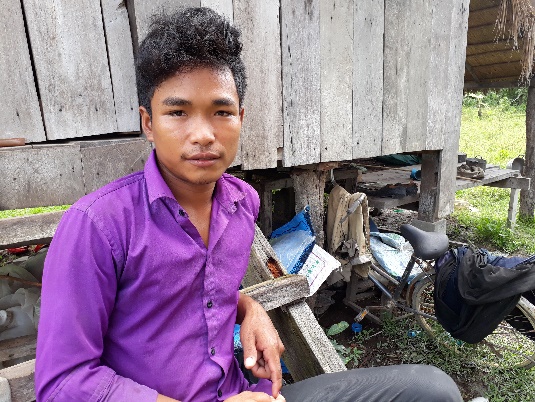Veal Village in Pursat Province in western Cambodia is surrounded by forests and mountains, and is home to 1,624 people in 257 households. The majority of people in Veal earn their living from forest related-activities yet it is the travel to and from the forest that has been the major cause of malaria cases in Veal. Based on the reports of the village malaria workers (VMWs), cases in Veal have increased significantly in 2017 from four cases in May to 23 cases in September.
Horn Channy, a 23 year old father to a little boy in Veal, works in one of the forests near the village. Channy has been a forest worker since he was 17 years old and usually spends one to two weeks in the forest every month. In order to reach his work site, Channy and the co-workers who go with him, must travel around 50 kilometers by buffalo cart, which takes them about two days.
Channy has had malaria many times in his life, and on one occasion, he was so sick that he could not work for months. In 2017, Channy was infected with malaria twice. In September, he had a severe headache and chills. On his way back from the forest, Channy met with members of an outreach team, which included VMWs and staff from the Cambodian Government and the PMI-supported Cambodia Malaria Elimination Project (CMEP), who diagnosed him with Plasmodium falciparum malaria. He was immediately put on treatment and given an insecticide-treated (ITN) bed net.
In addition to limited knowledge about malaria, Channy had never received an ITN, which prevents people from being bitten by mosquitoes while they sleep. In the forest, he used to sleep under a conventional hammock net and was bitten all the time.
“Thanks to the outreach team who provided me with a bed net, information about malaria, and free testing and treatment in the forest,” Channy said. “I used to have to go to a private provider in a local market and spend a lot of money to get malaria services,” Channy added.
Channy mentioned that, “Outreach activities are really necessary as they enable forest workers to access malaria diagnosis and treatment on time. I suggest continuing this activity, because I have seen many people who work in the forest infected with malaria with limited access to diagnosis and treatment.”
Monitoring is critical to support malaria outreach activities. A month later in October 2017, a VMW and CMEP team went back to follow up with Channy at his home. He had just returned from the forest. Channy had recovered from malaria and looked healthy. Channy shared, “I do not have malaria anymore. Now, I am educated about the disease, and I sleep under an insecticide treated hammock net. I also tell my friends how to prevent malaria. I would like to thank the health staff who have paid attention to forest workers and helped treat and prevent malaria.”


